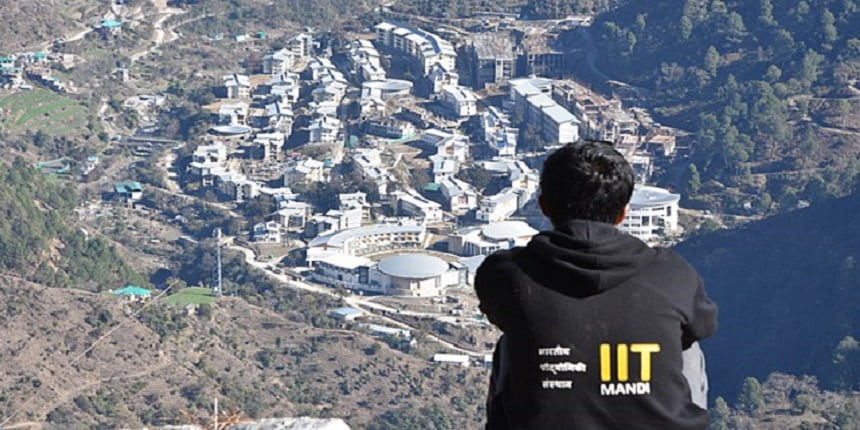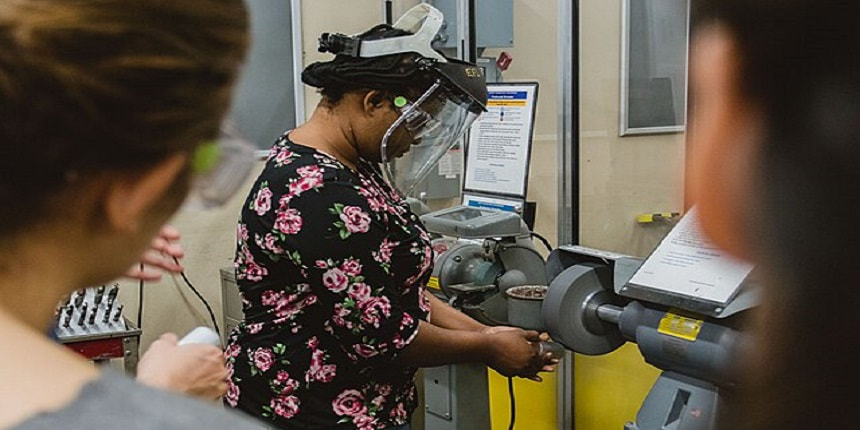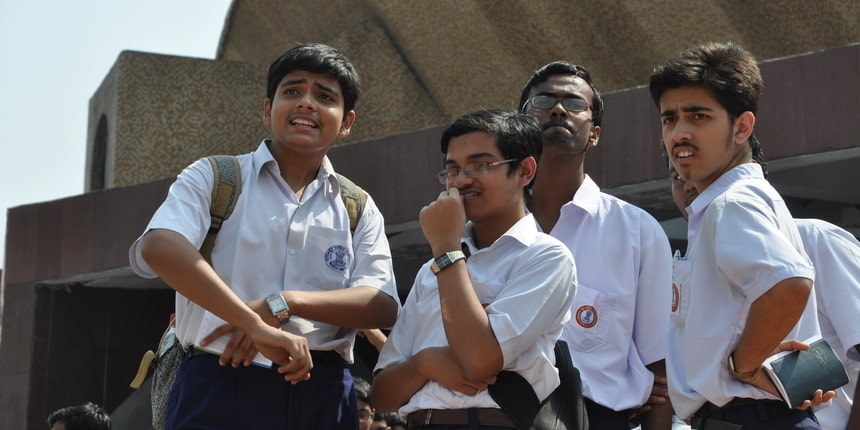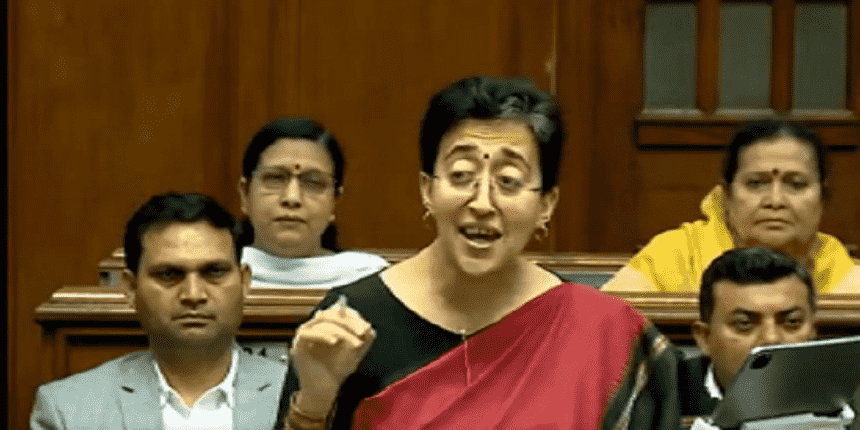Facilitate Research, Leverage Technology to address Faculty Shortage: Experts
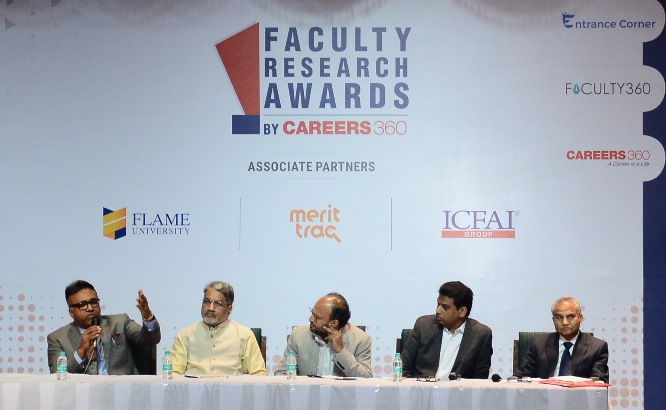
Sreetama Datta | March 23, 2018 | 06:56 PM IST
Expressing concern at the alarming shortage of quality faculty in the higher education system, a panel of eminent academicians and academic administrators asked institutions to promote strong research environment in their campuses to nurture good teachers. The academic-recruitment panel which was part of Career360 ‘Faculty Research Awards 2018’ also highlighted the ways technology can be leveraged in recruiting faculty members and selecting right sets of teachers for specific programmes.
The key speakers in the panel included Prof. Dr. C. Rajkumar (VC, O P Jindal Global University), Dr. Sekhar Viswanathan (VP, In-charge of International Relations, Placements and AP Campus, VIT University), Dr. Hargopal Reddy (Advisor, ICFAI Foundation), and Dr. Raghunath Shevgaonkar (VC, Bennett University). Mr. Sanjay Modi, MD, Monster for APAC in Middle East moderated the panel discussion.
Suggesting that institutions’ research has a big role to play in order to boost the output quality of institutions and address faculty shortage, the panel experts pitched for greater freedom for institutions with lesser government interference in the academic processes.
Shortage of good faculty
Setting the tone for discussion, Sanjay Modi raised the challenges associated with faculty recruitment in India and the demand-supply gap in academia. Prof. C Rajkumar said the key concern is shortage of quality faculty. He said, “The major challenge we need to address is that the bright students across disciplines are no longer coming into academia. As many as 40 per cent faculty positions are lying vacant in 47 central universities. As much as 30 to 35 per cent faculty positions are lying vacant in the IITs and IIMs. In the state universities, over 50 per cent faculty positions are lying vacant.” These statistics were quite alarming.
He said that this problem can be resolved by building an ecosystem of researchers who are ready to devote their life to pursue teaching, and not just by creating ADHOC appointments. To encourage the research, there is a need to create a system and environment where the faculty can be nurtured and mentored.
Adding statistical figures related to the faculty shortage, Dr. Raghunath Shevgaonkar quoted a report which states that India must produce 10,000 Ph.Ds every year for the next 10 years, which is much higher than the current output.
Hurdles in attracting good faculty
The panel also opined that the long-term career perception with teaching needs to change where it should be looked at being top option for research enthusiasts. Dr. Shevgaonkar said, “It is important for us to create good teachers and for that we must start valuing teachers and the teaching profession in better ways. Very often people disregard the teachers as people who don’t get a job anywhere else. This thinking needs to be radically changed. Secondly, there are many students in their under-graduation who have good teaching skills. These students need to be identified and shown the opportunity of enhancing their skills through proper mentorship at a national level.”
Retaining Talent in teaching profession
According to the panellist, one of the major causes for faculty shortage is the brain-drain. Recalling his experience during his visit to the SUSTech, a renowned University in China, Dr. Rajkumar said that China was investing significantly in faculty recruitment and development. “They also call back Chinese faculty who have moved to other countries by offering them good compensation and facilities to work in their own nation,” he said. We need to bring in this sense of retention for Indian faculty as well who have gone abroad to pursue the profession and offer them reasonable compensation to work in their own country, he added.
Enhancing Research Atmosphere
Why do institutions take up limited research? Is fund an issue? Or is it a systemic and ecosystem issue? Mr. Modi raised these questions for the panel to scrutinise the underlying problem of restricted research being done by faculty across institutes.
According to Dr. Shevgaonkar, there are three things required to carry out research – top quality faculty, top quality students and a liberal funding to perform a state-of-the-art research. He cited the example of the USA where faculty is lured to the teaching profession because of the ‘tenure system’ there. The best faculty wants to be associated with the universities there to give them a ‘tenure’ job. This problem in the system, coupled with a majority of the brightest minds who are choosing the USA over India to do their research, proves to be unfavourable for research in India, he said.
Dr. Viswanathan said that institutions must not rely only on Government funding and pool resources for research from different sources. “They must be able to obtain funding from the industry and corporate sector to encourage research,” he said adding that the involvement of corporate sector in research activity and bring be a win-win for both industry and academia.
Research Challenges- public institution Vs private institutions
The panel unanimously agreed that the challenges faced by the central and state institutions are greater than the private institutions. According to Dr. Reddy’s experience, “Litigation is a major hurdle faced by public institutions. Every step is countered by the UGCs or other government bodies.” A notice is issued by the governing bodies every now and then which cause disruption in the processes. This happens because there is no sound litigation system for the educational system in our country, he added.
The panel member also said that fee regulations also make it difficult for private institution to integrate research and develop capability for research along routine academic activities. “If we go by the book, then the faculty to student ratio must be 1:15 ideally. There are also conditions laid down that they cannot charge more than a certain amount as fee from students. Looking at stringent faculty to student ratio, it gets extremely difficult to maintain the standards of faculty and infrastructure. The cost per student goes up and this results in compromise being made with the quality of faculty in public institutions at times,” he said.
The Faculty Research Awards 2018, organised by Careers360, honoured outstanding researchers across 24 disciplines and also recognised special contribution by many other researchers. Honourable Union HRD Minister, Shri Prakash Javadekar presented the awards to the researchers and also gave away citations to many professors. Eminent academicians, Vice-Chancellors, Academic Administrators and Researchers exchanged their ideas and thoughts on challenges and opportunities for academic research in the country during the panel discussion.
Follow us for the latest education news on colleges and universities, admission, courses, exams, research, education policies, study abroad and more..
To get in touch, write to us at news@careers360.com.
